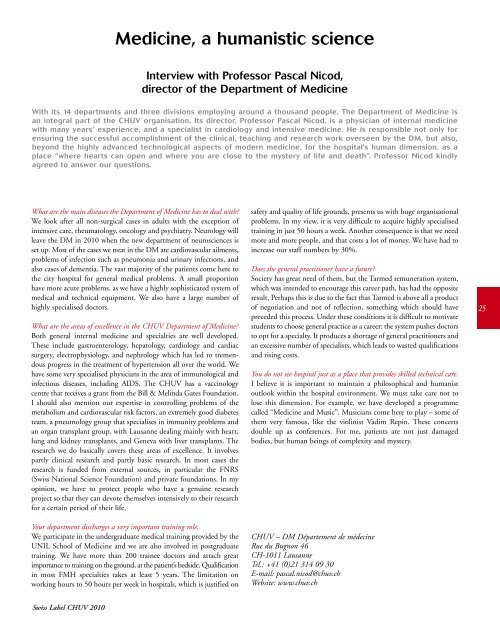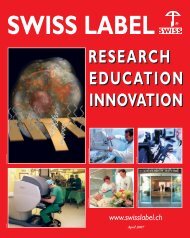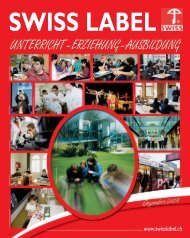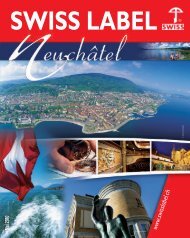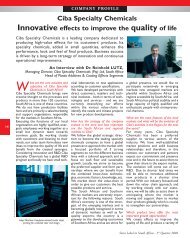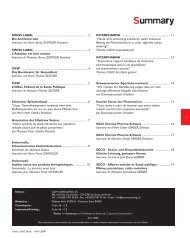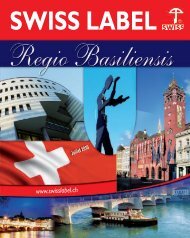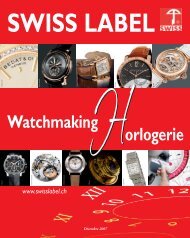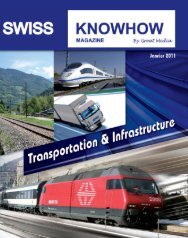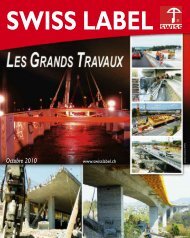SWISS LABEL INFORMATIQUE-XP - Com Consulting SA
SWISS LABEL INFORMATIQUE-XP - Com Consulting SA
SWISS LABEL INFORMATIQUE-XP - Com Consulting SA
Create successful ePaper yourself
Turn your PDF publications into a flip-book with our unique Google optimized e-Paper software.
Medicine, a humanistic scienceInterview with Professor Pascal Nicod,director of the Department of MedicineWith its 14 departments and three divisions employing around a thousand people, The Department of Medicine isan integral part of the CHUV organisation. Its director, Professor Pascal Nicod, is a physician of internal medicinewith many years’ experience, and a specialist in cardiology and intensive medicine. He is responsible not only forensuring the successful accomplishment of the clinical, teaching and research work overseen by the DM, but also,beyond the highly advanced technological aspects of modern medicine, for the hospital’s human dimension, as aplace “where hearts can open and where you are close to the mystery of life and death”. Professor Nicod kindlyagreed to answer our questions.What are the main diseases the Department of Medicine has to deal with?We look after all non-surgical cases in adults with the exception ofintensive care, rheumatology, oncology and psychiatry. Neurology willleave the DM in 2010 when the new department of neurosciences isset up. Most of the cases we treat in the DM are cardiovascular ailments,problems of infection such as pneumonia and urinary infections, andalso cases of dementia. The vast majority of the patients come here tothe city hospital for general medical problems. A small proportionhave more acute problems, as we have a highly sophisticated system ofmedical and technical equipment. We also have a large number ofhighly specialised doctors.What are the areas of excellence in the CHUV Department of Medicine?Both general internal medicine and specialties are well developed.These include gastroenterology, hepatology, cardiology and cardiacsurgery, electrophysiology, and nephrology which has led to tremendousprogress in the treatment of hypertension all over the world. Wehave some very specialised physicians in the area of immunological andinfectious diseases, including AIDS. The CHUV has a vaccinologycentre that receives a grant from the Bill & Melinda Gates Foundation.I should also mention our expertise in controlling problems of themetabolism and cardiovascular risk factors, an extremely good diabetesteam, a pneumology group that specialises in immunity problems andan organ transplant group, with Lausanne dealing mainly with heart,lung and kidney transplants, and Geneva with liver transplants. Theresearch we do basically covers these areas of excellence. It involvespartly clinical research and partly basic research. In most cases theresearch is funded from external sources, in particular the FNRS(Swiss National Science Foundation) and private foundations. In myopinion, we have to protect people who have a genuine researchproject so that they can devote themselves intensively to their researchfor a certain period of their life.Your department discharges a very important training role.We participate in the undergraduate medical training provided by theUNIL School of Medicine and we are also involved in postgraduatetraining. We have more than 200 trainee doctors and attach greatimportance to training on the ground, at the patient’s bedside. Qualificationin most FMH specialties takes at least 5 years. The limitation onworking hours to 50 hours per week in hospitals, which is justified onsafety and quality of life grounds, presents us with huge organisationalproblems. In my view, it is very difficult to acquire highly specialisedtraining in just 50 hours a week. Another consequence is that we needmore and more people, and that costs a lot of money. We have had toincrease our staff numbers by 30%.Does the general practitioner have a future?Society has great need of them, but the Tarmed remuneration system,which was intended to encourage this career path, has had the oppositeresult. Perhaps this is due to the fact that Tarmed is above all a productof negotiation and not of reflection, something which should havepreceded this process. Under these conditions it is difficult to motivatestudents to choose general practice as a career: the system pushes doctorsto opt for a specialty. It produces a shortage of general practitioners andan excessive number of specialists, which leads to wasted qualificationsand rising costs.You do not see hospital just as a place that provides skilled technical care.I believe it is important to maintain a philosophical and humanistoutlook within the hospital environment. We must take care not tolose this dimension. For example, we have developed a programmecalled “Medicine and Music”. Musicians come here to play – some ofthem very famous, like the violinist Vadim Repin. These concertsdouble up as conferences. For me, patients are not just damagedbodies, but human beings of complexity and mystery.CHUV – DM Département de médecineRue du Bugnon 46CH-1011 LausanneTel.: +41 (0)21 314 09 30E-mail: pascal.nicod@chuv.chWebsite: www.chuv.ch25Swiss Label CHUV 2010


